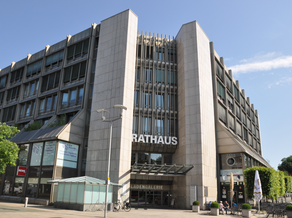Property drainage
The city of Bad Homburg v.d.Höhe is responsible for wastewater disposal in accordance with the Hessian Water Act (HWG). In accordance with the HWG and the Wastewater Ordinance (AWS), the Urban Drainage product area has the role of a supervisory and approval authority for land drainage systems. The construction, modification or dismantling of wastewater systems, in particular house connections, require approval from the city.
Focal points
Particular focal points in connection with property drainage are the protection of buildings against backwater from the public sewer system, rainwater management and, last but not least, the renovation of underground pipes and house connections (collectively known as supply sewers). We also specify the requirements for industrial/commercial wastewater systems that discharge non-domestic wastewater into the public sewer system. Certain objects or substances may not be discharged into the wastewater system due to the operational safety of the property drainage system and the public wastewater system as well as the risk of water pollution.
Rainwater utilization
Rainwater run-off from roof surfaces can be used for washing laundry, flushing toilets, as cleaning water and/or for watering the garden. For the amount of rainwater used instead of drinking water, the property owner saves on the costs of purchasing fresh water and the charge for waste water linked to the fresh water purchase. The cistern volume is also taken into account in the calculation of the rainwater fee in favor of the fee payer. Cisterns are sometimes prescribed in development plans for new buildings.
Surface unsealing
The fee for rainwater is based on the degree of sealing of the connected property. It is advisable to keep the sealed surfaces to a minimum and to make the paved surfaces water-permeable when planning new buildings or redesigning existing ones. Courtyards and parking areas with permeable eco-paving, for example, reduce the rainwater charge compared to a fully sealed asphalt surface.
Rainwater retention
In the case of large properties (800 m² or more drainage area) with a high degree of sealing (usually commercial properties), it can be assumed that the local sewer system will not be able to cope with the design rainfall, making rainwater retention essential. A corresponding rainwater retention area (RRR) must be agreed with the municipal drainage system as part of the respective approval procedure.
Backwater
We would like to emphasize to all owners and operators that they are also responsible for the protection of their buildings and properties. Taking the above measures in good time can prevent considerable damage and costs. In addition, these measures help to reduce the burden on public infrastructure and increase the safety of the entire neighborhood.
Discharge bans - what does not belong in the sewer
Please do not use the toilet and other drains to dispose of waste. Otherwise you will clog your sewer and pollute waterways. Hygiene waste such as cotton buds, cotton pads, panty liners, wet wipes, sanitary towels or tampons belong in the garbage can. The cost of cleaning your sewer in the event of soiling is the responsibility of the property owner and is often a burden on the tenant/landlord relationship.
Building materials, varnishes and paints not only settle in the pipes of the property drainage systems, but also lead directly or indirectly to water pollution if pipes leak or are discharged into rainwater pipes. Please refer to the Bad Homburg waste calendar in this regard. Food waste must also not be disposed of via the sewer system, as it increases the food supply in the sewer and thus the rat population. Rats can transmit pathogens and parasites and damage buildings and plants. It is therefore in everyone's interest to comply with the discharge bans in the wastewater regulations of the town of Bad Homburg v.d.Höhe.



